|









|
|
Living in substandard conditions
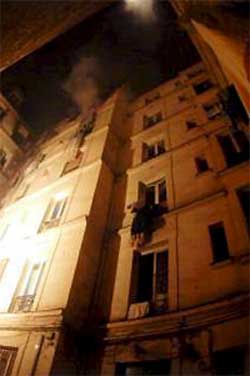
|
Fires have caused deaths right in the
middle of Paris. The buildings burned were run-down and unfit
for habitation where families of immigrants were living. I went
to visit these families who have lost their children in the blazes.
They have feelings of anger while keeping their dignity. |
I had met them for the first time
in 1991. At that time they were camping on the grounds of Quai
de la Gare where now the François Mitterrand Library is
built. They had then been promised a new housing.
14 years later, these families are still waiting. I share the
anger of these people. There is no fatality.
There are many empty buildings that are in good condition in
Paris but the Prefects (government administrative officers) do
not want to apply the Law for requisition.
The Law against exclusion forces the Mayors to have 20% of social
housing in their towns. But many of them refuse to apply this
Law.
As for the lessors of social housing, they privatise their housing
units and make them profitable.
|
At this period of children going back
to school, the Minister of the Interior has decided to evacuate
the families from these run-down buildings and unfit for habitation.
This goes on at daybreak. |
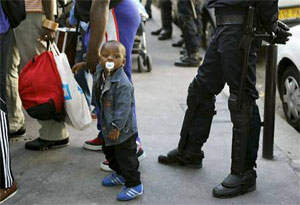
|
I went to visit these Africans who
live in a building just about to be evacuated. I climbed up to
the 4th floor to meet Abdoulaye, a man from Mali who is 32 years
old.
The families are afraid and sleep with their eyes open, waiting
for the police. Their luggage is ready because they will have
to leave fast. The rest has been placed in security in the houses
of friends.
Abdoulaye has been in France the last 5 years. He has no official
papers but has found a job. When he left Mali, he left his wife
and an 8 months old child. He has not seen them since and now
his wife has left him. He does not sleep in the building any
more because he could be arrested by the police and sent back
in his country. Abdoulaye, himself, keeps his dignity. He knows
that God will not abandon him. |
|
|

|
|
|
|
|
|
|
|
The annual festivities
of the " L'Humanite" Newspaper
|
As it is the case every year, I like to attend the great gathering
organized by the French Communist Party for the Paris area. People
come from all over France and the festivities last for three
days. |
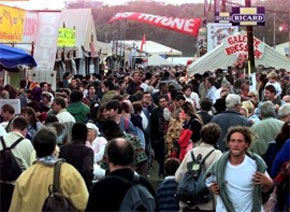
|
Debates are made on issues of the day, there are information
booths, a section reserved for books, a programme of music performances
and country cooking products which are always a great success.
I arrive by metro and bus that are crowded with young people.
Impossible to make a mistake: we are all going to the same place.
This popular gathering has something unique that I find nowhere
else. In this crowd where I am walking, there is no hierarchy
between the people. Everyone is on the same level as everybody
else. Here there is no title, no duties nor responsibilities
for these human beings that meet on a equal basis. There is no
place for relations of domination. This is so rare in day-to-day
activities!

|
I take pleasure in greeting people. Most of the time I do
not know them but they are happy to shake my hand.
On my wrist, a paper bracelet gives me access to the three-day
celebration.
I will not be able to come on the last day, Sunday. As I was
leaving the grounds, a young black man asked if I could give
him my bracelet. I held out my wrist so he could take the bracelet:
" It is an honour for me that it is now yours ". |
|
|
|
|

|
|
|
|
|
|
|
|
At the Ministry of the
Interior
The National Coordinating Committee of the people with
no official papers has asked me to join the delegation going
to meet the Head of the Cabinet of the Minister. There are 7
of us.
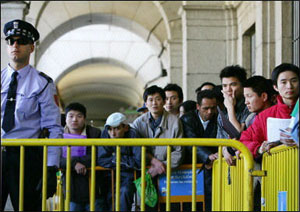
|
The first difficulty we had to overcome was to enter this
highly secured government building, because many delegates had
no official papers. The police officials were categorical: no
identification, no entry in the building. |
Then the African women started to use humour: " Hey,
you certainly don't want to have the Head of the Cabinet waste
his time, he is expecting us". They start negotiations over
the phone and finally the situation was resolved.
A mémorandum is presented by one of the delegates on the
dramatic, unjust and intolerable situations lived by people with
no official papers on a day-to-day basis.
Children in age of schooling had been arrested in schools because
they had no official papers. This had caused such a commotion
in the school community that support committees were immediately
formed.
There were initiatives taken so that children with no official
papers could eat in the cafeteria. This way, we can be certain
that they will eat at least one meal a day.
As for the sick, which sick person with no official papers can
have the money to receive health care in his country of origin?
If at all these structures exist?
The Head of the Cabinet listened carefully, asked questions and
for more details.
He seemed quite surprised when I told him that never in 10 years
had we experienced such a dramatic time for those with no official
papers . |
|
|
|

|
|
|
|
|
|
|
|
A Retreat for priests
The Cardinal of Lyon had asked me to lead a retreat for
priests of his diocese. It is difficult to refuse the request
of a Cardinal!
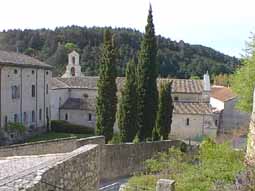
|
The retreat was held in the Aiguebelle Abbey that could accommodate
35 participants. We willingly attended the services for the Trappist
Monks, except for the vigils during the night. |
The mass was concelebrated in the morning in this beautiful
Romanic Church. I gave the homily and I had to speak on two occasions
during the day.
When I learned that the retreat would be in Aiguebelle, I immediately
remembered the Thibirine Monks who had been slaughtered in Algeria.
The Thibirine Monastery had been in fact founded by the Aiguebelle
one. The Father Abbot and his community have links since a long
time with the Muslim world.
The greeting by the monks was fantastic. The Father Abbot gave
an interesting talk on his expectations from a monastic presence
in the Muslim territory.
The Cardinal spoke one night to the priests in a direct and simple
style. Many projects.

|
It was a gift for me to pass these five days in a fraternal
atmosphere with priests full of human and spiritual experiences.
I witnessed once again that a life spent in the service of the
Gospel is an adventure that shapes the heart of those who are
committed. |
|
|
|
|

|